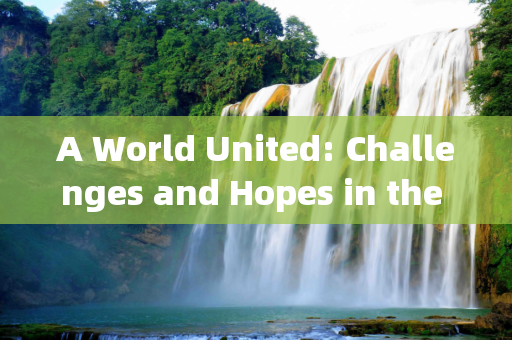Ladies and Gentlemen,
Good day to you all. It is with a heavy heart that I stand before you today, not just as a fellow human being, but as a witness to the unprecedented times we are living in. The COVID-19 pandemic has swept across our world like a storm, leaving in its wake a trail of challenges that have tested the very fabric of our societies. Yet, amidst the darkness, there are glimmers of hope that remind us of the resilience and unity of the human spirit. Today, I wish to discuss the global challenges we face and the hopes that guide us forward.
The pandemic has exposed the vulnerabilities of our interconnected world. Borders, once seen as barriers, have become porous as the virus knows no boundaries. Economies, once robust, have faltered under the weight of lockdowns and social distancing measures. Lives, once filled with the bustle of daily routines, have been upended by the need for isolation and caution. The global challenge of COVID-19 is not just a health crisis; it is a crisis that has permeated every aspect of our lives.
Healthcare systems worldwide have been pushed to their limits. Hospitals have been overwhelmed, and healthcare workers have been stretched thin, working tirelessly to save lives in the face of a relentless enemy. The pandemic has highlighted the disparities in access to healthcare, with those in underprivileged communities often bearing the brunt of the virus's impact. It has also underscored the importance of investing in public health infrastructure and the need for a global approach to health emergencies.
Economically, the pandemic has triggered a recession that has affected businesses and individuals alike. Industries have shuttered, jobs have been lost, and the global economy has been plunged into uncertainty. The economic fallout has been felt most acutely by those in the informal sector, women, and young people, who often have fewer safety nets to fall back on. The challenge now is to rebuild economies in a way that is sustainable, equitable, and resilient to future shocks.
Socially, the pandemic has forced us to reconsider the way we interact with one another. The need for physical distancing has led to a surge in digital communication, changing the way we work, learn, and socialize. While this has brought about some positive changes, such as increased flexibility and reduced carbon emissions from travel, it has also highlighted the digital divide, with those without access to technology being left behind. The challenge is to ensure that as we adapt to new ways of living, no one is left out.
Education has been another sector deeply impacted by the pandemic. With schools closed, millions of students have had to adapt to remote learning,澳门免费资料最准的资料 a shift that has not been without its struggles. The digital divide has become a chasm, with students in rural areas and those from low-income families facing significant barriers to accessing online education. The challenge is to ensure that the pandemic does not exacerbate existing inequalities in education and that all students, regardless of their circumstances, have the opportunity to learn and thrive.
Despite these challenges, there are reasons for hope. The pandemic has shown us the power of global cooperation. Scientists from around the world have come together to develop vaccines at an unprecedented pace, demonstrating what can be achieved when we work as one. The spirit of solidarity has been evident in the way countries have shared resources, information, and support with one another.
The pandemic has also sparked innovation. From the rapid development of vaccines to the adaptation of technology for remote work and learning, the crisis has pushed us to think creatively and adapt quickly. This spirit of innovation will be crucial as we navigate the road to recovery and beyond.
Moreover, the pandemic has reminded us of the importance of community. We have seen neighbors helping neighbors, volunteers stepping up to support those in need, and communities coming together to care for the most vulnerable. This sense of collective responsibility and compassion is a powerful force that can guide us through the challenges ahead.
As we look to the future, we must seize the opportunities presented by the pandemic to build back better. This means investing in healthcare systems that are robust and equitable, creating economies that are sustainable and inclusive, and fostering societies that are resilient and compassionate. It means learning from the past and using the lessons of the pandemic to inform our actions moving forward.
In conclusion, the COVID-19 pandemic has indeed presented us with formidable challenges. Yet, it has also shown us the strength of our collective spirit and the potential for positive change. As we stand together on the precipice of a new era, let us be guided by the hope that we can and will overcome these challenges, and in doing so, create a world that is more resilient, equitable, and united.
Thank you.













 京公网安备11000000000001号
京公网安备11000000000001号 京ICP备11000001号
京ICP备11000001号
还没有评论,来说两句吧...